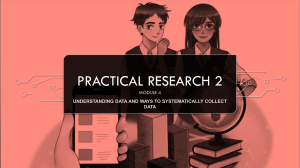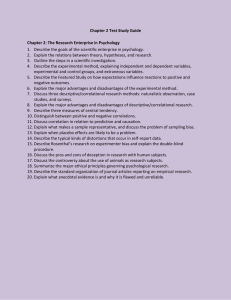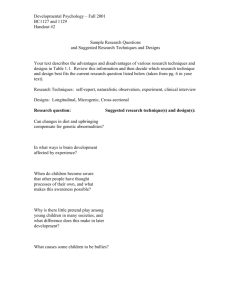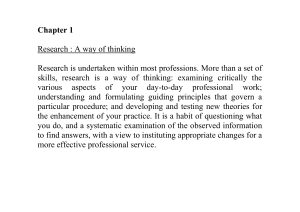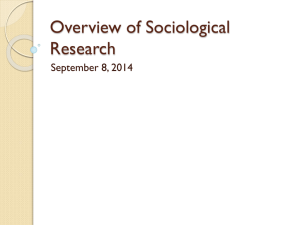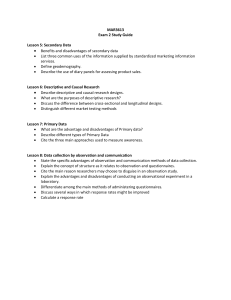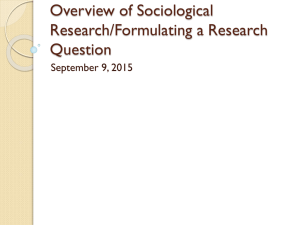Uploaded by
SUKH VINDER KAUR BASSI-DECULING
Practical Research 2 Module: Research Designs & Data Collection
advertisement
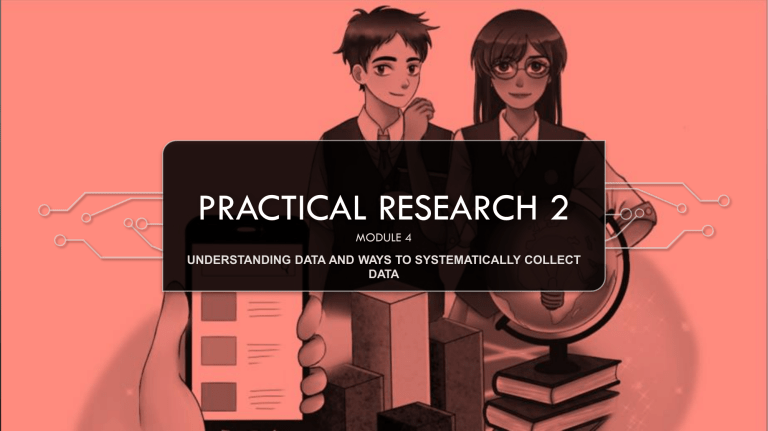
PRACTICAL RESEARCH 2 MODULE 4 UNDERSTANDING DATA AND WAYS TO SYSTEMATICALLY COLLECT DATA MODULE 4 LESSON 1: RESEARCH DESIGNS LESSON 2: SAMPLING PROCEDURE AND THE SAMPLE LESSON 3: RESEARCH INSTRUMENT, VALIDITY AND RELIABILITY LESSON 4: RESEARCH INTERVENTION LESSON 5: PLANNING DATA COLLECTION PROCEDURE LESSON 6: PLANNING DATA ANALYSIS OBJECTIVE KNOW THE DIFFERENT RESEARCH DESIGN SELECT APPROPRIATE RESEARCH DESIGN RESEARCH DESIGN logical and coherent overall strategy that the researcher uses to integrate all the components of the research study (Barrot, 2017, p 102). In order to find meaning in the overall process of doing your research study, a step-by-step process will be helpful to you. ACTIVITY 1: PLAN YOUR WORK Draw a procedural flowchart to illustrate your plan. STUDY TITLE: PERFORMANCE ANALYSIS OF A CAR-TO-CAR VISIBLE LIGHT COMMUNICATION SYSTEM System modelling Application of the model Data Gathering Performance Analysis Conclusion Recommendations RESEARCH DESIGNS: THE BIG FIVE Descriptive Correlational Ex-post Facto Quasi Experimental Experimental RESEARCH DESIGNS: THE BIG FIVE Descriptive a design that is exploratory in nature. The purpose of descriptive research is basically to answer questions such as who, what, where, when, and how much. So this design is best used when the main objective of the study is just to observe and report a certain phenomenon as it is happening. RESEARCH DESIGNS: THE BIG FIVE Correlational The main goal of this design is to determine if variable increases or decreases as another variable increases or decreases. This design seeks to establish an association between variables. It does not seek cause and effect relationship. It has two major purposes: (a) to clarify the relationship between variables and (b) predict the magnitude of the association RESEARCH DESIGNS: THE BIG FIVE Ex-post Facto . If the objective of the study is to measure a cause from a preexisting effects, then Ex Post Facto research design is more appropriate to use. RESEARCH DESIGNS: THE BIG FIVE Quasi Experimental This research design aims to measure the causal relationship between variables. The effect measured is considered to have occurred during the conduct of the current study. Subjects are assigned NOT RANDOMLY to groups (Control or Variable group). RESEARCH DESIGNS: THE BIG FIVE Experimental This research design is based under a controlled or manipulated environment. It applies treatment and manipulation more extensively compared to quasi-experimental design. Random assignment of subjects is done increasing the validity of the study. ACTIVITY 2: SUMMARIZE Research Design 1. Descriptive 2. Correlational 3. Ex post facto 4. Quasiexperimental 5. Experimental Goal How variable is handled or manipulated ACTIVITY 3: IDENTIFY DESIGN Relationship between Academic Stressors and Learning Preferences of Senior High School Students ANS: Correlational ACTIVITY 3: IDENTIFY DESIGN Impact of the Implementation of COVID – 19 Health Protocols in Supermarkets on Consumer Behaviors ANS: Ex-post facto ACTIVITY 3: IDENTIFY DESIGN Effects of Story Telling on Quality of Sleep of Children ANS: Descriptive ACTIVITY 3: IDENTIFY DESIGN • A QUASI-EXPERIMENTAL STUDY OF THE EFFECT OF MATHEMATICS PROFESSIONAL DEVELOPMENT ON STUDENT ACHIEVEMENT ANS: Quasi-Experimental THANK YOU AND SEE YOU SOON!
